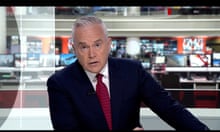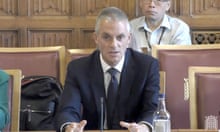The newsreader Huw Edwards has resigned and left the BBC, the corporation has said.
A BBC spokesperson said: “Huw Edwards has today resigned and left the BBC. After 40 years of service, Huw has explained that his decision was made on the basis of medical advice from his doctors.
“The BBC has accepted his resignation, which it believes will allow all parties to move forward. We don’t believe it appropriate to comment further.”
Edwards, 62, was suspended by the broadcaster in July last year over allegations he received inappropriate images from a younger person and gave them money.
Monday’s announcement came three weeks after the Times reported that Edwards was expected to still be named the corporation’s highest-paid newsreader in July’s annual accounts, having earned up to £439,000 last year despite his suspension. The corporation has confirmed Edwards has not received a payoff.
It was reported that BBC bosses were braced for a backlash over Edwards getting his six-figure salary despite being off-air for eight months.
He was the corporation’s highest paid newsreader, with a salary of £435,000-£439,999 in the year 2022-23, according to the corporation’s most recent annual report. This was up from £410,000-£414,000 the year before.
Edwards has not made any public statement since he was named as the BBC presenter at the centre of the allegations.
The veteran news anchor was named in a statement by his wife, in which it was said he was experiencing “serious mental health issues” and, after the controversy emerged, had received inpatient hospital care after experiencing a “serious episode”. She said he would “respond to the stories that have been published when he was well enough to do so”.
The BBC later apologised to the parents of a young person who made a complaint about the presenter, admitting it should have acted more quickly. The parents of the young person said a complaint made in May last year was ignored by the corporation.
The BBC acknowledged the complaint had been made in May and was assessed by the corporate investigations team, but the BBC boss, Tim Davie, said at that point there was no “allegation of criminality”.
Police found no evidence of criminal behaviour. A subsequent Newsnight investigation alleged that Edwards, who has denied any wrongdoing, was also sharing “inappropriate messages” with present and former BBC staff.
The young person at the heart of the allegations has described them as “rubbish” and blamed their parents for going public.
The corporation launched a review into its complaints procedure after the scandal, carried out by the Deloitte partner Simon Cuerden. It found that while the BBC had the policies, procedures and knowhow about how to deal with the most serious complaints, there was a “clear need for greater consistency across the BBC”.
The report found that the complaint was made at “a BBC location in Cardiff on 18 May”, but while the BBC’s corporate investigations team sought to make contact with the complainant the case was not “escalated” and the case not logged in the BBC system at the time, “meaning that there was no opportunity for wider visibility of the case within the BBC”.
Edwards had long been a fixture in the corporation’s coverage of major political and royal events. He announced Queen Elizabeth II’s death on the BBC and presented coverage of her funeral. He also anchored the broadcast of the king’s coronation last year.
Edwards was a Westminster correspondent for 13 years, and has played a key role in the BBC’s political reporting, taking over election coverage from the long-serving David Dimbleby in 2019.
He told Radio Times in 2019: “I’m going to let you in on a secret: the first time a senior BBC manager dangled this carrot in front of me was in 1992. So it’s been at the back of my mind since then.”








